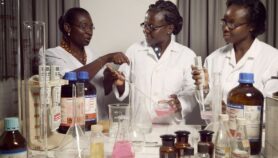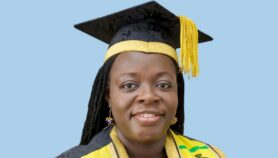By: Maina Waruru
Send to a friend
The details you provide on this page will not be used to send unsolicited email, and will not be sold to a 3rd party. See privacy policy.
[NAIROBI] African governments and higher education leaders should explore innovative methods to fast-track doctoral training to accelerate socio-economic development and address the challenges facing the continent, experts say.
The call was made during a session on doctoral training in science in Africa at the 4th Kenya National Science Week last month (11-15 May).
Cosmas Ochieng’, the chief executive officer, Kenya-based African Centre for Technology Studies, called for new approaches to help the continent produce enough doctoral holders to match Africa’s pace of development.
“Innovative ways of producing PhDs are needed to cope with the current demand for doctorates in sciences and also to replace Africa’s ageing first generation of PhD holders.”
Cosmas Ochieng’, Kenya-based African Centre for Technology Studies
“Research and production of knowledge is often undertaken by PhD holders and currently there is a severe deficit of PhDs in Africa which should be filled in order to realise accelerated development,” Ochieng’ said. “Innovative ways of producing PhDs are needed to cope with the current demand for doctorates in sciences and also to replace Africa’s ageing first generation of PhD holders.”
He explained that countries such as Brazil that has witnessed accelerated development in recent years produced high numbers of doctorates in the last decade, with the University of Sao Paolo alone producing more doctorates than all universities in South Africa in the past ten years.
Mike Stewart, a professor at the Milton Keynes campus of the UK-based Open University (OU), added that one way of accelerating PhDs in sciences is to adopt the OU model which uses affiliated research institutions across the world to enable postgraduate students acquire doctorates while studying in their home countries and at a lower cost.
Stewart, a neurosurgeon, revealed that the OU has started an affiliated research centres (ARC) programme, whereby doctoral students undertake their studies at research institutions in their home countries under the guidance of local supervisors approved by the university without the students having to travel to the United Kingdom for studies.
One such centre is the Kenya Medical Research Institute (KEMRI)-Welcome Trust research centre in Kilifi, Kenya, where some 23 students are currently undertaking PhD studies under this arrangement with the OU. A similar project is continuing in the Gambia.
“Under this arrangement students get UK quality education through a flexible programme while still working at their usual places of work and at a lower cost,” Stewart observed.
Under the ARC programme, it costs 1000 British pounds (about US$1,575) a year compared with about US$25,200 to undertake the studies in United Kingdom, he added.
According to Sam Kinyanjui, a training coordinator at KEMRI, since 2010 at least six students have been graduating with PhDs in medical sciences from KEMRI each year under the ARC programme.
“What Africa needs is to learn from some of the most workable solutions available around the world and apply them at home to get out of the current shortage of PhDs,” Michieka told participants.
This article has been produced by SciDev.Net's Sub-Saharan Africa desk.














